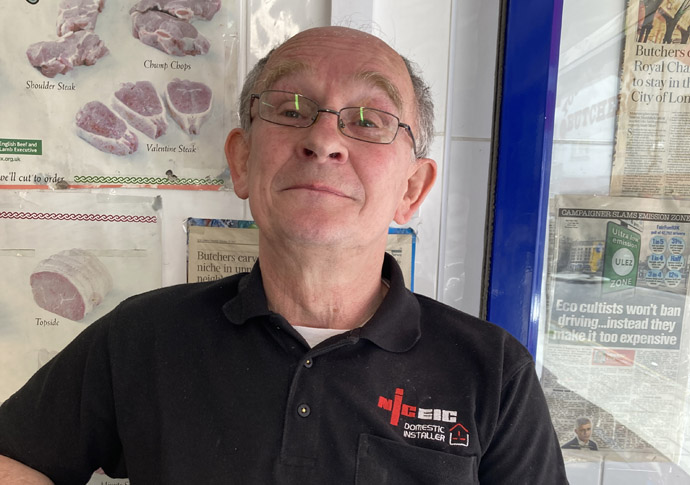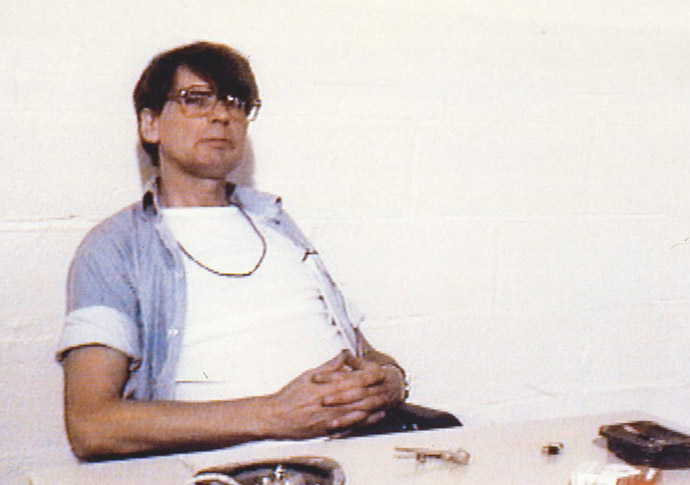‘Covid, crime and the cost of living crisis – we’re all up against it all the time’
Retiring electrician warns of widespread ‘anxiety’ – and recalls day he met a killer
Friday, 2nd June 2023 — By Charlotte Chambers

Dorian Munday, who is set to retire to the south coast, says Covid has had a significant impact on many people’s lives in Islington
AN electrician – who just weeks into his 40-year career was sent to serial killer Dennis Nilsen’s home – says he is leaving work and Islington in search of a better life after inflation and Covid created a society of “anxious people” who cannot afford to pay their bills.
Dorian Munday has lived and worked in Crouch Hill for four decades and in that time says he has “seen it all”, from dungeons in basements to that fateful trip to Nilsen’s Cranley Gardens home in 1983.
But one thing the veteran electrician was not prepared for so far into his working life was the dire impact of Covid and inflation on people’s’ bank accounts and moods – and a glut of house robberies and tradesmen van burglaries in the area.
Describing the change over the past two years, he said: “You go about and, generally, you have an alright day. You know, you talk to people and they’re good fun and you can have a nice time. But it’s got worse and worse. Because all you’re up against all the time is a lot of people anxious about money all the time. And a lot of stress. And everyone you talk to has been robbed or stolen from.”
While crime statistics on burglaries and thefts from cars has remained relatively stable over the last five years, Mr Munday claims that most tradesmen “expect” to be robbed around once a year but never “bother” to report it to the police.
“What’s the point?” he asked. “Nobody reports to the police anymore, no tradesmen do. Police are not managing robberies.”

Dennis Nilsen
Just last month, while working on a house in Petherton Road in Canonbury, he had £5,000 worth of tools stolen from the back of his van.
The woman’s house he was working on had also just been burgled, while his neighbour had been robbed last year, along with his own van and a another builder’s van in the street.
Mr Munday, from Trinder Road, is now planning to sell his Crouch Hill home and retire to Torquay to get away from the crime and depression of London.
For the past five years burglary rates in Islington have remained at around 2,000 per year, while theft against motor vehicles has also been steady at just below 2,000 per year.
Mr Munday was a young washing machine engineer working for Hoover when he had an encounter with Nilsen, who killed at least 12 young men and boys between 1978 and 1983.
“He was a little, unassuming bloke. One of them ones you just wouldn’t remember,” he said of Nilsen, who was caught later on that same day after Mr Munday and his colleague left and a Dyno-Rod worker was called in, who found human remains in the drains.
Mr Munday was later grilled by Scotland Yard, telling them there had been a terrible stench in the flat and bin bags everywhere. In addition, a pot of what appeared to be stew was bubbling away on the hob while an axe to chop meat was on the counter.
Ten years later, Mr Munday was called to fix the exact same washing machine at Nilsen’s old home after the landlord rented the flat out to a newly arrived New Zealand family.
As the new tenant ushered him in, he was flooded with memories from a decade earlier: “Some houses have got a really nice vibe, and some don’t, and this one didn’t, this was dark. He took me upstairs and all the memories came flooding back.”
As if to confirm the dark history of the place, the new tenant told him his wife and daughter had all been unwell since moving in – and Mr Munday had no choice but to inform them of its past, even though it meant losing his payment for fixing the washing machine. “They left immediately,” he said.
